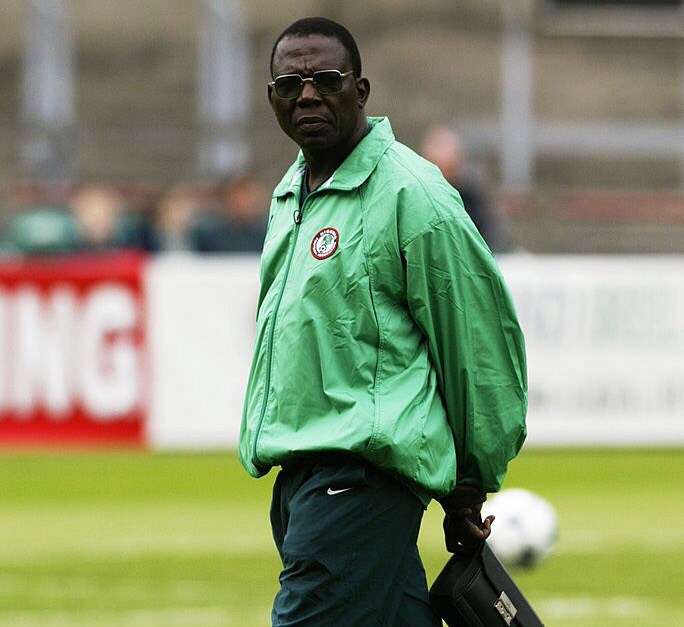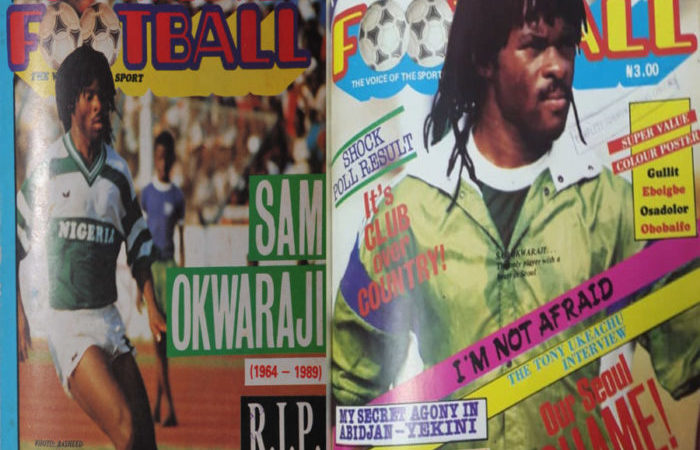[vc_row][vc_column][vc_column_text]
Introduction
STILL smarting from the huge disappointment of her failure to qualify for the 2006 World Cup finals in Germany, Nigeria went to the 2006 Africa Cup of Nations finals in Egypt looking to reassert herself as a force in African football. And with the bronze medals from the previous two tournaments (2002 and 2004) still dangling on their necks, the Super Eagles knew that the minimum achievement that would pacify their fans was the trophy itself.
THE QUALIFIERS
For the first time in the history of the Africa Cup of Nations, the qualifying tournament for the 2006 finals doubled as the qualifiers for the World Cup finals. CAF had decided to merge the two as a cost-saving measure for most cash-strapped African federations while also reducing the rift between the European clubsides of most top African players and their country’s FAs over the release of the players for international games.
For the combined qualifiers for Egypt 2006 Nations Cup and Germany 2006 World Cup, Nigeria was paired with Rwanda, Angola, Algeria, Gabon and Zimbabwe. The top team at the end of a round-robin series of matches would qualify for the World Cup while the top three teams would qualify for the ANC. Nigeria were the clear favourites to win the group but Angola upset the form books by grabbing the World Cup ticket instead.
Coach Christian Chukwu, who had led the Eagles to a widely celebrated ANC bronze medal in 2004 in Tunisia, had been left in charge for the start of the 2006 qualifiers, but he was fired by the NFA following a 1-1 draw with Angola in Kano which seriously compromised Nigeria’s chances of winning the group. His assistant, Augustine Eguavoen, was appointed to take over and, although the Eagles responded by beating Algeria 5-2 away and Zimbabwe 5-1 at home in their last two qualifiers, it was too late to frog-leap Angola who narrowly won the group on the head-to- head rule after both teams finished on 21 points each.
Most Nigerian soccer fans blamed Chukwu’s ineptitude for Nigeria’s failure to win her qualifying group. While this argument had some merit, it also has to be said that the NFA contributed immensely to the failure. For one, the FA did not realize that the head-to-head rule would be applied in the case of a tie and the chairman, Alhaji Ibrahim Galadima, actually upbraided the media for “spreading wrong information” about the rules of the qualifying tournament. For another, the FA took the crucial home game against Angola to Kano, a venue which proved unfavourable to the Super Eagles because of it’s hot weather and bumpy pitch.
To add insult to injury, Galadima famously declared to inquisitive journalists that the World Cup was “not Nigeria’s birthright” when the media demanded that he should apologise for the bungled World Cup ticket. That statement would ultimately earn Galadima the wrath of Nigerian soccer fans who insisted on his removal at the next election of the association. It came to pass.
In summary, Chukwu began the qualifying race for Egypt 2006 but it was Eguavoen who completed it. In 10 games, Nigeria won six, drew three and lost only one; scored 19 goals and conceded just six. Not a bad record overall, but it just wasn’t good enough for the World Cup in Germany. The Eagles had to settle for the Nations Cup in Egypt.
PREPARATION AND SQUAD SELECTION
The Eagles, captained again by Austin Okocha, were among the earliest teams to open their Nations Cup camp. But it was a horde of home based players who stole out of Lagos for the camp in Faro, Portugal on December 22, 2005.
Nigeria camped in the same region while preparing for the finals two years earlier. Just as it was then, the Super Eagles could only make do with low profile warm-up matches against modest European clubs who were on break in Algrave.
The feeling in the air was an infectious desire by the Eagles to win the gold in Egypt to placate disappointed Nigerians who were still mourning the failure to qualify for the World Cup in Germany.
However, despite the large pool of 45 players invited for camping in Faro, Portugal, only 16 were in camp as at New Year’s Day! It was a sad commentary for a national team that many were hoping would re-enact the feats of 1980 and 1994 when the Eagles emerged African champions.
“The World Cup failure was a big blow to all of us (Super Eagles players). We are very sorry for disappointing our fans and we apologise for the pains we might have caused them,” Super Eagles vice captain, Joseph Yobo pleaded. “We want to quickly redeem ourselves and get this memory erased from the minds of our fans. The only way we can do that is to win the Nations Cup in Egypt,” the Everton of England strongman posited, But such pledge was not matched with action as the players virtually sauntered into the team’s camp in Portugal. The team were lodged in two five-star hotels in Faro. First, they were checked-in at the Brown Hotels and later moved to the Royal Park Hotel. They trained twice daily and the sessions were led by coach Augustine Eguavoen, assisted by Daniel Amokachi and Samson Siasia. Ike Shorunmu and Amusa Adisa were in charge of the goalkeepers.
The preparation for Egypt was turpsy-turvy. The administrative lapses on the part of the NFA continued and Eguavoen had to jump repeatedly on available flights back to Nigeria to beg for funds to run the camp in Portugal. That distraction probably made the team’s exercise in Faro drab and lacked the promise of a great outing in Egypt. To make matters worse, Eguavoen allowed some players to leave the camp to play games for their European clubsides. That scenario painted a picture of unseriousness and affected the team’s rhythm. The team also did not get much attention from the Nigerian embassy in Portugal which was rather disappointing for the players.
THE TOURNAMENT
The Super Eagles arrived Cairo to a rapturous welcome and were subsequently lodged at the Helnam Hotel, Port Said, venue of their Group D matches against Ghana, Senegal and Zimbabwe. One interesting episode that took place when the Eagles landed was the adoption of a 12-year-old Egyptian boy by striker Nwankwo Kanu. The lad attended the Eagles’ first training session where he professed his admiration for the 1996 and 1999 African Player of the Year. Moved by the young man’s love for him, the then West Brom of England ace commenced proceedings to adopt Mohammed with the approval of the lad’s parents.
The Eagles first game was against the Black Stars of Ghana at the El Masry Stadium. The player who stole the show for Nigeria was Olympique Marseille midfielder Wilson Oruma who got a rare start ahead of injured captain, Austin Okocha. Oruma showed good composure on the ball, won tackles and moved forcefully and deftly through the sea of legs in Ghana’s midfield.
Although he was unlucky not to have scored a goal, he was deservedly declared the Man of the Match in a game the Eagles won 1-0, courtesy of Taiye Taiwo’s strike off a free kick in the 85th minute. Zimbabwe were next but, ironically, the Eagles struggled to find their rhythm, putting up a mediocre performance in the first half. The introduction of Nwankwo Kanu and Mikel Obi, however, revived the team as the talented Mikel (who was then enmeshed in a transfer row between Chelsea and Manchester United both in England) curled in a corner kick for Christian Obodo to head Nigeria into the lead.
The second goal came barely three minutes later when Obodo turned provider for Mikel who drove the ball home from the edge of the box. Mikel’s performance earned him the LG Fair-Play Award despite playing for only 37 minutes. With qualification for the quarter-finals already secured, the Eagles filed out in their third game against Senegal very relaxed. It was a game Nwankwo Kanu showed just why his experience was very much needed in the team as he provided the touches and techniques that saved the Eagles. Kanu came off the bench to provide two brilliant assists that were converted by Obafemi Martins to tame the stubborn Teranga Lions 2-1 after 90 minutes.
The quarter-final saw the Eagles square up against their 2004 semi-final conquerors, Tunisia. It was pay-back time as Nigeria drew the first blood as early as the 5th minute when Obinna Nsofor pounced on a loose ball to blast home from the edge of the box. Tunisia however equalised in the 47th minute and, as in 2004, the game eventually dragged into a penalty shoot-out. This time around, Nigeria triumphed with goalkeeper Vincent Enyeama becoming the hero after stopping four penalty kicks (including one during the regulation time). The goalkeeper also converted a kick for Nigeria in the shoot-out.
Then came the semi-final against Cote d’Ivoire at Alexandria where Nigeria’s hopes of winning Africa’s top prize came crashing down to a Didier Drogba solitary strike in the 46th minute. The Eagles technical crew committed a selection blunder as the team was unnecessarily reshuffled for the crunch game and the Elephants made Nigeria pay for it. The Nigerian defence had hoped for an offside call to be made by the centre referee, South Africa’s Jerome Damon, but that was not to be as Drogba slipped behind the Eagles defence-line to shoot through Enyeama’s legs.
In a desperate bid to rescue the match, coach Eguavoen introduced the injured Austin Okocha for his first appearance in the tournament, but Okocha failed to conjure any magic as Cote d’Ivoire ran away with a famous 1 -0 victory. Nigeria thereafter claimed the bronze yet again for the third successive time with a 1-0 win over Senegal in the match for third place. Garba Lawal grabbed the winner after firing home off a John Utaka cross. The game turned out to be the last appearance for skipper Okocha who had earlier given notice of his wish to retire from international football.
RELATED: Nigeria’s AFCON Stories Episode 15 – TUNISIA 2004 By Augustine Okocha
THE AFTERMATH
The match-winning bonus of the Eagles was shared among the players immediately after the third place match against Senegal right inside the stadium. Bnei Yehuda FC, the Israeli club of first choice goalie, Enyeama, waited patiently for their boy to collect his own share of the booty before whisking him into a private jet back to Israel.
The rest of the team were moved to the Moven Peak Hotel, Cairo where a reception was held in their honour by Nigeria’s sports minister, Seidu Sambawa after which the foreign-based players dispersed to their various clubsides while the home-based players returned to Nigeria with the officials.
THE SQUAD
GOALKEEPERS: Vincent Enyeama (Bnei Yehuda, Isreal), Austin Ejide (Etoile, Tunisia), Dele Aiyenugba (Enyimba).
DEFENDERS: Joseph Yobo (Everton, England), Taye Taiwo (Marseille, France), Chidi Odiah (CSKA Moscow, Russia), Joseph Enakharhire (Dinamo Moscow, Russia), Obinna Nwaneri (Esperance, Tunisia), Paul Obiefule (Viborg, Denmark).
MIDFIELDERS: Austin Okocha (Bolton, England), Garba Lawal (Iraklis, Greece), Sani Kaita (Sparta Rotterdam, Holland), Yusuf Ayila (Dinamo Kyiv, Russia), Christian Obodo (Udinese, Italy), Wilson Oruma (Marseille, France), Mikel Obi (Lyn Oslo, Norway).
FORWARDS: Obafemi Martins (Inter Milan, Italy), Nwankwo Kanu (West Brom, England), Julius Aghahowa (Shakhtar Donetsk, Ukraine), John Utaka (Rennes, France), Obinna Nsofor (Chievo, Italy), Stephen Makinwa (Palermo, Italy), Peter Odemwingie (Lille, France).
COACH: Eguavoen Augustine.
ASSISTANT COACHES: Daniel Amokachi, Amusa Adisa, Ike Shorunmu.[/vc_column_text][/vc_column][/vc_row]


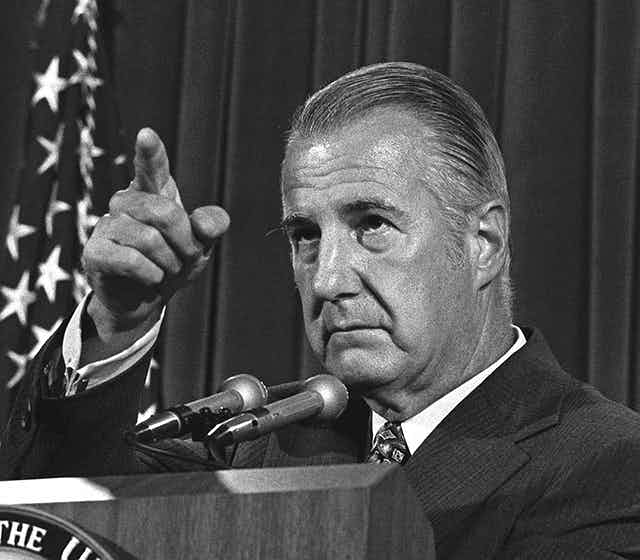
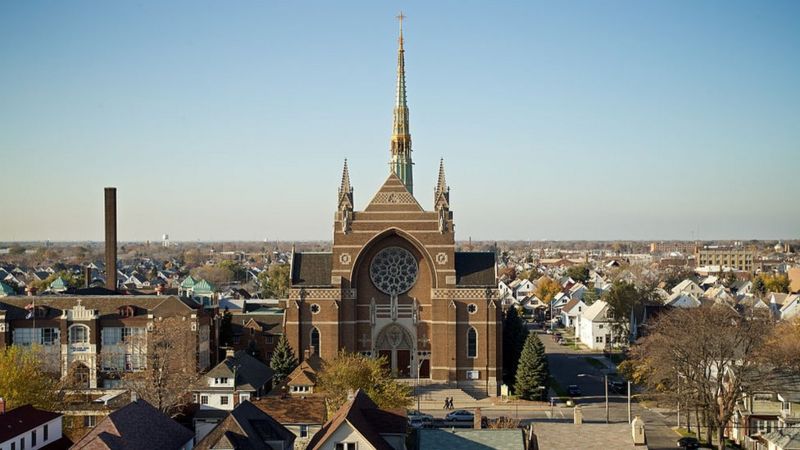
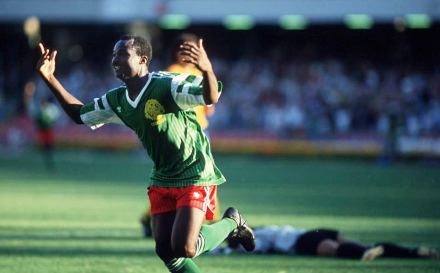
![Watch Odegbami recreate his first goal in the 1980 AFCON final [Video] 6 Watch Odegbami recreate his first goal in the 1980 AFCON final [Video] 6](https://naijasuperfans.com/wp-content/uploads/2020/03/20200323_165745.png)
![How Nigeria won AFCON in 1980 – Segun Odegbami with Mumini Alao [Video] 7 How Nigeria won AFCON in 1980 – Segun Odegbami with Mumini Alao [Video] 7](https://naijasuperfans.com/wp-content/uploads/2020/03/20200321_201622.png)


